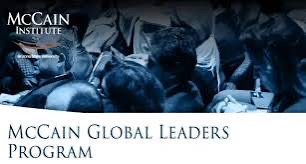To adapt to and meet the needs of an ever-changing and complex global environment, the McCain Institute will determine a global thematic focus area as well as technical areas of focus for each region and recruit participants who work on relevant issues related to each theme. Throughout the 12-month program, the Leaders will participate in programming that is both regional and global with the goal of connecting them to a highly relevant and targeted professional peer group in their home region, as well as a broader and diverse network of global peers.
2025 Global Theme: Advancing Democracy and Human Rights
The McCain Institute recognizes the ever-changing and complex global landscape as it relates to great-power competitions, the spread of authoritarianism, threats to democracy, abuse of human rights and growing challenges to the health of our planet driven by climate change. It also recognizes that 2025 will bring unprecedented change and challenge to the global community because of recent and upcoming elections occurring around the world as well as conflict occurring in numerous regions. The McCain Institute will seek to identify a diverse cohort of leaders who are working to advance democracy and human rights in their home countries through a variety of professions and projects.
2025 Regional Themes
Western Hemisphere: Protecting the Human Rights of Migrants
The Western Hemisphere will bring together those who are working to reduce push factors related to migration as well as those who are working on policy and frontline efforts related to migration flows in the Western Hemisphere. The regional theme will focus on what policy and what efforts can be done to humanize the migration process and reduce risk factors related to the safety, health and well-being of migrants.
Europe and Eurasia: Countering the Spread of Authoritarianism
Democratic backsliding and interference from Russia continue to sow instability throughout Europe and Eurasia. The regional cohort will focus on internal and external threats to democracy posed by disinformation, disregard for state sovereignty as well as rising nationalism and extremism. It will also focus on proactive solutions to these threats and expose the cohort to broader networks that can help advance democracy and human rights throughout the region.
Africa and the Middle East: Building the Foundations for Conflict Resolution
Conflict persists through the Africa and Middle East region and young leaders are being called upon to identify solutions for resolution. The regional cohort will examine factors driving conflict, the humanitarian consequences and what steps can be done to pave a path towards resolution and reconciliation. The cohort will learn from regional case studies and build a network of experts across Africa and the Middle East in an effort to build a foundation that can support participants in their own work related to conflict resolution.
Asia and Oceania: Managing the Great Power Competition in the Asia-Pacific
China and the United States continue to compete for economic and security interests throughout the Asia-Pacific region and beyond. The regional cohort will focus on the various threats to economic and political stability that persist throughout the region as well as to how advancing democracy and human rights can counter the instability created by the great power competition. This will be done through a case study of country within the region and by building a network of support throughout the region.
Following in the footsteps of Senator John McCain’s legacy of being on the front lines of defending and advocating for democracy, freedom, and human rights, Leaders will embark on a journey that will help provide them with the tools needed to be champions of democracy in their home country and region.
Link: https://www.mccaininstitute.org/programs/leadership-programs/mccain-global-leaders/



